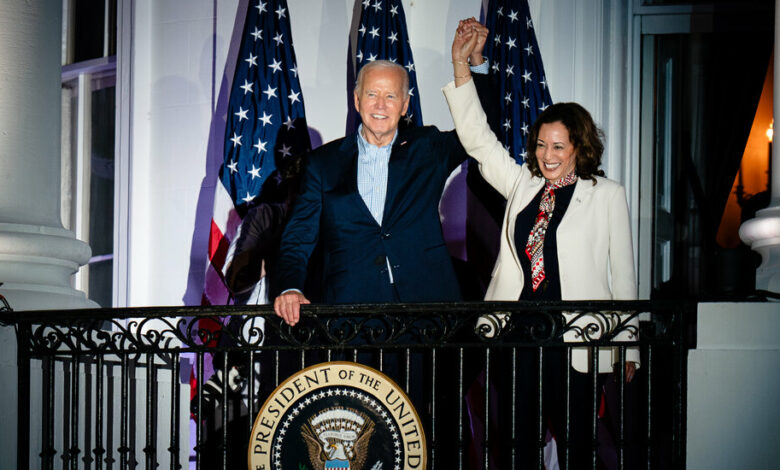For Kamala Harris, the challenge is to get ready without getting ready

She was there when he hosted Democratic governors at the White House, she was on the line when he called the prime minister of Israel, and she was next to him on the balcony overlooking the South Lawn when he celebrated the Fourth of July. As the fireworks were about to begin, he took her hand and raised it in the air in a gesture of unity.
In these days of uncertainty in the White House, Vice President Kamala Harris is staying physically and politically close to President Biden, determined not to let anyone say she is anything other than utterly loyal. But the result means that the person who may have to step up when he leaves office cannot be seen as preparing for the challenge of a lifetime.
With Mr. Biden’s future hanging in the balance, perhaps no one is in a more delicate position than Ms. Harris. For the first time since she took the oath as vice president in January 2021, Democrats are taking a serious look at her, with many embracing the idea that she could lead the party in November. In practice, though, she must ignore the chatter and renounce any interest unless Mr. Biden changes course and passes the baton to her.
“She’s in a tough position,” said the Rev. Al Sharpton, the civil rights leader who spoke with Ms. Harris on Friday night at the Essence Festival of Culture in New Orleans. “But the job of vice president is tough.”
Ms. Harris’s advisers insist that she is doing nothing to prepare for the eventuality that she must suddenly launch a presidential campaign, and there is no evidence to the contrary. But Democrats, acting with her interests in mind, even without her consent, are quietly playing out what a Harris campaign might look like.
If Mr. Biden drops out of the race, as some Democrats are urging, there are two main scenarios for Ms. Harris. Assuming he doesn’t immediately resign and make her the incumbent president, he could immediately endorse her as the party’s nominee against former President Donald J. Trump and throw his weight behind her to help deliver the nomination at the Democratic National Convention next month.
Other Democrats could still try to win the nomination, but it would be hard to overcome the advantage she would have if Mr. Biden openly urged his pledged congressional delegates to support her. In the second scenario, however, he could simply leave it up to the delegates to choose the nominee, opening the door to a more competitive and volatile weeks-long battle.
There is already speculation about possible running mates should she win. Ms. Harris would be the first black and Asian American woman to be nominated by a major party, and in the cold, identity-driven logic of modern politics, many assume she will have to balance her ticket with a white man, preferably one who is not seen as too liberal.
Two people close to the Biden-Harris team said an emerging favorite was Gov. Roy Cooper of North Carolina, a Southern moderate who must work with a Republican Legislature in a state that some Democrats thought they could flip in November. Ms. Harris and Mr. Cooper met when they were both attorneys general in their states.
Others frequently mentioned by those close to the Biden-Harris campaign are Governors Andy Beshear of Kentucky and Josh Shapiro of Pennsylvania. Mr. Beshear impressed many national Democrats by winning a second term in a conservative state last year, while Mr. Shapiro could theoretically help Democrats capture Pennsylvania, a battleground crucial to victory in November. But Kentucky is not seen as a likely win, and Mr. Shapiro has been in office for less than two years.
How Ms. Harris herself feels about such calculations remains anyone’s guess at this point. The message from her office has gone out to staffers, donors and allies: No speculation, no chitchat. It will only hurt her, not to mention the president. She understands that she can’t even be drawn into such private conversations, allies said, because they would inevitably leak and make her appear disloyal to Mr. Biden.
“Nobody has that conversation,” said Donna Brazile, former chairwoman of the Democratic National Committee. “And I know from the conversations that I’ve had and the conversations that I know others have had. She stands, she stands her ground. She respects the president; she’s going to stand by the president. She’s comfortable with the president. That doesn’t happen. Nobody has dismissed someone like me.”
Mr. Sharpton said that Ms. Harris gave no indication of planning during his conversation Friday night. Still, he said he believed others were thinking ahead on her behalf. “I think there are some who are independent of her who are preparing,” he said. “Some of them say they haven’t gotten a signal from her, and I haven’t. But there are people who are preparing just in case.”
If Ms. Harris wants to prove her loyalty to Mr. Biden, there is concern in her inner circle that his advisers are doing the same. Some of Harris’s allies are deeply suspicious that some of Mr. Biden’s allies are trying to save him by telling wavering Democrats that they can’t abandon him because they’d be stuck with a vice president who can’t win in November.
Ms. Harris has done nothing of that in public. Instead, she has offered herself as a one-woman validator, reassuring nervous Democrats about the president while implicitly making her case for herself through her own actions.
“I see Joe Biden when the cameras are on and when the cameras are off: in the Oval Office, negotiating bipartisan deals,” she told a campaign rally in Las Vegas the day after Biden’s debate with Trump. “I see him in the Situation Room, keeping our country safe; on the world stage, meeting with foreign leaders who often look to him for advice. Joe Biden is a leader who always fights for the people of our country.
Ms. Harris is not the first vice president to feel conflicted about sticking with the president who appointed them while nurturing their own ambitions for the office. Being vice president is inherently a job caught between two fires, the only person besides the president who is nationally elected, yet with power that largely comes from the top of the ticket. In the famous words of John Adams, the first to hold the post, being vice president means that “I am nothing, but I can be everything.”
The sensitivity has been particularly evident at certain points in history. Vice President Gerald R. Ford made it a point to demonstrate unwavering loyalty even as the Watergate scandal increased pressure on President Richard M. Nixon to resign. So did Vice President Al Gore when President Bill Clinton was impeached and pressured to resign after lying under oath about an extramarital affair.
Mr. Ford and Mr. Gore both understood that any perception to the contrary would be deeply damaging. But loyalty had its price. Mr. Ford eventually pardoned Mr. Nixon, a deeply unpopular act that may have cost him the 1976 election. Mr. Gore was widely criticized for declaring on the day of Mr. Clinton’s impeachment that he would “go down in history as one of our greatest presidents.” Mr. Gore lost his own presidential campaign in 2000, blaming it at least in part on Mr. Clinton’s scandal.
“The worst thing a vice president can do right now is be too eager to get the president out,” said Elaine Kamarck, a former aide to Mr. Gore who now works at the Brookings Institution. “It’s just counterproductive. I think some pretty inexperienced people are going to call Kamala Harris and say, ‘Can I do this? Can I do that?’ And if she’s smart, she’s going to squash that pretty hard.”
One challenge for Ms. Harris is that she has no established national political organization to turn to when the opportunity arises. Her own 2020 presidential campaign collapsed before the first primary.
But those close to her expect her to inherit the Biden-Harris organization and the Democrats’ $240 million in bank accounts if Biden withdraws, either before the nomination or certainly afterward if she gets the nod. While she would likely install some of her most trusted people at the top of the campaign, she would be running the race that Biden started but couldn’t finish.
In the meantime, she’ll continue to find her way, campaigning again on Tuesday in Las Vegas, Wednesday in Dallas and Thursday in Greensboro, N.C., to deliver Biden’s message to anyone who will listen — and wait to see whether, like Adams, she goes from nothing to everything.




